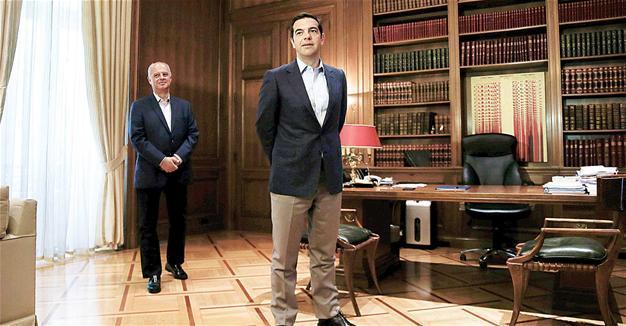Greek judges accuse Tsipras government of ‘dirty’ attacks
ATHENS

Judges in Greece have reacted angrily to a blunt barrage of government criticism over recent court rulings, naming them “dirty” attacks.
The government “is systematically attempting to subjugate and control justice,” the association of judges and prosecutors protested over the weekend.
“Ministers and lawmakers launch baseless accusations daily... they seek to erode the prestige of the Greek justice system... following the example of Turkey and Poland,” they said.
“The Greek public can understand the danger posed by a voracious executive, seeking to operate unchecked,” the association said.
The row erupted after a court earlier this month decided to jail a young graduate student accused of links to one of Greece’s most active far-left extremist groups.
The 29-year-old linguist identified only by her first name, Irianna, was handed a 13-year prison sentence in June as a suspected accomplice of the Conspiracy of Fire Nuclei group.
Police have said they matched her to a partial fingerprint on a gun clip found hidden with other weaponry in an Athens park in 2011.
She has denied the charges, and her legal team has said the alleged fingerprint findings are too partial to be conclusive beyond doubt.
The controversial move to jail her sparked street protests earlier this month, some of them attended by members of Prime Minister Alexis Tsipras’ leftist party Syriza.
A number of his ministers and lawmakers have also taken turns attacking justice over the ruling.
Among the critics was Justice Minister Stavros Kontonis, who called the decision to deny Irianna release from prison pending appeal an “unpleasant surprise.”
“It is strange to say the least, when certain people convicted of drug trafficking are allowed release pending trial,” Kontonis told parliament last week.
Government spokesman Dimitris Tzanakopoulos also called the move a “bad development” which would go down in the “dark annals of Greek justice.”
To calm tempers, the head of Greece’s top administrative court, the Council of State, made a rare public address on the issue on July 24.
“Judges... do not take instructions [from the government and lawmakers],” said Nikos Sakellariou, adding: “Judges must be politically neutral.”
Sakellariou’s uncharacteristic public statement, read out to reporters, was carefully timed. It fell on the 43rd anniversary of the restoration of democracy in Greece following a brutal seven-year army dictatorship.
Judges were outraged in October when, on the eve of a key ruling on a private TV tender, a pro-government newspaper reported that one of the Council judges deciding the outcome had had an illicit affair.
“In order to control justice, they have used the dirtiest means available to the state - paid-for journalists,” the judges’ association said on July 23.
Critics note that Greek justice needs oversight too. A decade ago, a group of judges were given heavy sentences for taking bribes, attempted extortion and abuse of power.
In another case that has riled the government, the Supreme Court prosecutor last week demanded the reopening of an investigation into the former head of Greece’s state statistics service, a case Tsipras’ administration has been trying to close.
Former statistics chief Andreas Georgiou faces charges that he allegedly inflated Greek deficit figures to help international creditors impose harsher terms for a multi-billion-euro bailout in 2010.
One of Greece’s foremost legal experts, and a Tsipras ally, President Prokopis Pavlopoulos on July 24 appeared to admonish the government.
“Man can only live and create in freedom [where] there is a distinction of powers,” Pavlopoulos said in an address marking the democracy anniversary.
He added that the judiciary had to operate “without interference or bias” and deserved “respect of their independence” from executive and legislative branches.
Law experts say the open dispute threatens to divide a country already under enormous pressure from a seven-year economic crisis and hardship.
“The judges must lower the tone, but the government must also understand its limits,” Aristotelio university law professor Grigoris Kalfelis told Athens municipal radio.
“This is very dangerous,” warned a prosecutor speaking on condition of anonymity.
“It is an institutional attack destabilizing democracy itself,” he told AFP, whilst lamenting the escalating row with the judges.
“This is paranoia.”
 Judges in Greece have reacted angrily to a blunt barrage of government criticism over recent court rulings, naming them “dirty” attacks.
Judges in Greece have reacted angrily to a blunt barrage of government criticism over recent court rulings, naming them “dirty” attacks.